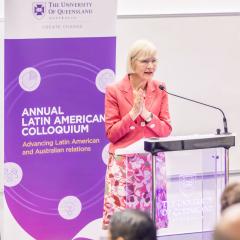Dr Jaime Manalo IV, a University of Queensland (UQ) alum and recipient of the prestigious Australia Awards Philippines Alumnus of the Year, is transforming the future of rice farming in the Philippines through a groundbreaking youth-led initiative that bridges the digital divide in rural communities.

Dr Manalo, who completed his Master of Communication for Social Change and later his PhD at UQ, is the architect of the Infomediary Campaign—an award-winning program that mobilises high school students to serve as information providers for rice farmers in remote areas of the Philippines. His work, rooted in the principles of participatory development and social inclusion, has been hailed as a model for agricultural innovation and youth engagement.
The Philippines, one of the world’s largest consumers of rice, faces persistent challenges in agricultural extension services. With over 2 million rice farmers and only around 13,000 extension workers, many farmers—especially those in isolated communities—lack access to timely, relevant, and comprehensible farming information.
Dr Manalo’s Infomediary Campaign addressed this gap by training high school students to access, interpret, and relay agricultural information to their farmer-parents and local communities. These students, dubbed “infomediaries,” use digital tools such as the PinoyRice web portal and the PhilRice Text Center, as well as printed materials, to disseminate knowledge on sustainable rice farming practices.

“Many of our farmers have limited formal education and struggle with English-language resources,” Dr Manalo explained.
“By empowering their children—who are tech-savvy and more comfortable navigating digital platforms—we created a new communication pathway that is both effective and culturally resonant.”
Dr Manalo credits his transformative experience at UQ’s Centre for Communication and Social Change for shaping his approach to development work. His PhD research focused on the social impacts of drought in agricultural communities, highlighting issues such as chronic poverty, family separation, and even survival-driven behaviours like transactional sex.
“UQ taught me to look beyond the numbers and understand the human stories behind agricultural statistics,” Dr Manalo said.
“It gave me the tools to lead research that is not only rigorous but also deeply empathetic and policy relevant.”
Now serving as the Head of the Socioeconomics Division at the Philippine Rice Research Institute (PhilRice), Dr Manalo leads national research projects on climate change adaptation, mental health in farming communities, and technology uptake. His work integrates social science into agricultural policy, ensuring that the voices of farmers are heard in decision-making processes.
The Infomediary Campaign, which began as a pilot project in 2012, has since expanded to over 200 schools and reached more than 4,000 youth in remote rice-farming communities across the Philippines. It has been featured at the United Nations Committee on World Food Security in Rome and the UN Food and Agriculture Organization (FAO) recognised the campaign as a model in youth and climate action in its publication launched during the Youth Summit in New York in 2019.

In 2024, Dr Manalo was named Australia Awards Alumnus of the Year in the Philippines, selected from a pool of over 40 nominees. The award recognises Filipino leaders who have made significant contributions to their communities through the skills and knowledge gained from Australian education.
“I was humbled and surprised,” Dr Manalo said. “There are so many Australia-educated Filipinos doing incredible work. I’m just grateful that our campaign is making a difference.”

Beyond improving rice yields and reducing pesticide use, the campaign has inspired hundreds of students to pursue agriculture-related degrees. In some schools, up to 60 students have enrolled in agricultural programs after participating in the campaign.
“Introducing students to the relevance and excitement of agriculture as a career option can reshape their perceptions,” Dr Manalo said.
“It’s not just about farming—it’s about food security, climate resilience, and national development.”
As the Philippines continues to grapple with climate change and rural poverty, Dr Manalo’s work stands as a beacon of hope—and a testament to the power of education, innovation, and youth leadership.
Find out about Australia Awards at UQ
Dr Manalo developed the Infomediary Campaign during his Australia Awards master's scholarship at UQ, where he also earned his PhD.



